|
|
|
Sort Order |
|
|
|
Items / Page
|
|
|
|
|
|
|
| Srl | Item |
| 1 |
ID:
176716
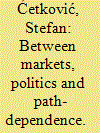

|
|
|
|
|
| Summary/Abstract |
This article contributes to the recent scholarly attempts towards bridging different energy studies perspectives in explaining the change of energy systems. Informed by political, socio-technical and techno-economic perspectives on energy transitions, we focus on explaining the divergent solar and wind power deployment rates across six Central and Eastern European countries. We suggest and test the proposition that the interplay of four key factors has shaped this development: state capacities, relations with Russia, technological lockin and electricity import dependency. We find that the countries relations towards Russia, the level of nuclear power lock-in and the state intervention in the energy sector have been instrumental in affecting the adoption of wind and solar power. The integrated framework and the findings presented in the article should encourage future energy transition research to capture and trace the interplay among different factors in an integrated and comparable manner.
|
|
|
|
|
|
|
|
|
|
|
|
|
|
|
|
| 2 |
ID:
169214
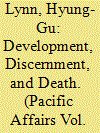

|
|
|
|
|
| Summary/Abstract |
Ron Dore’s 1977 article in Pacific Affairs, “South Korean Development in Wider Perspective,” is a rare example of the scholar known for his writings on Japan applying his analytical lens on South Korea. What were some of this article’s most notable areas of foresight and elision related to development studies? This essay answers this question by interpreting connections to publications before and after 1977 to analyze areas of insight under the rubric of “discernment” and overlooked subjects under “death.” On one hand, Dore’s essay was ahead of the curve in its deft foreshadowing of post-developmentalist, varieties of capitalism, and developmental state approaches to economic development. On the other, Dore sidestepped the effects of death on economic development in three forms: literal—effects of changing mortality rates on investments in education and human capital; industries related to death—wars, munitions production and arms expenditures; and the aftereffects of the death of a scholar—the revisiting and renewal of debates that can sometimes emerge as a result.
|
|
|
|
|
|
|
|
|
|
|
|
|
|
|
|
| 3 |
ID:
115708


|
|
|
|
|
| Publication |
2012.
|
| Summary/Abstract |
What explains Germany's exceptional labor market performance during the Great Recession of 2008-09? Contrary to accounts that emphasize employment protection legislation or government policy (i.e., short-time work), this article argues that actions by firms-embedded in ever-changing coordinative institutional structures-were crucial. Firms chose to keep rather than shed labor, a strategy induced by (i) a "toolkit" of flexible labor market instruments that had evolved incrementally over the past thirty years; (ii) wage restraint and successful internal restructuring of firms during the past decade, which fueled an export boom before the crisis. Firms thus had some margin for maneuver, using internal flexibility to protect their investment in skilled workers. These and other institutional changes driven by firms reflect a process of successful adaptation to external economic challenges, but did not fundamentally undermine Germany's coordinated form of capitalism. The result is not a new German model that was purposefully designed; instead German firms slowly discovered new ways to cope with economic challenges.
|
|
|
|
|
|
|
|
|
|
|
|
|
|
|
|
| 4 |
ID:
157498


|
|
|
|
|
| Summary/Abstract |
After the global financial crisis, economists have been downbeat about the growth prospects of the capitalist world economy, leading many to argue that we have re-entered a period of “secular stagnation”. The phenomenon of secular stagnation is intrinsically connected to the evolution of global macroeconomic imbalances. During the pre-crisis era of the “Great Moderation”, the widening of global and European trade imbalances temporarily alleviated the problem of secular stagnation by forging a symbiotic yet unsustainable relationship between debt-financed consumption-led growth models in deficit countries and export-led growth models in surplus countries. The re-surfacing of secular stagnation and the asymmetric adjustment of these imbalances after the crisis can both be traced back to the domestic political constraints experienced by many advanced market economies in trying to revive their pre-crisis growth models.
|
|
|
|
|
|
|
|
|
|
|
|
|
|
|
|
| 5 |
ID:
165597
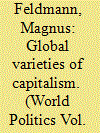

|
|
|
|
|
| Summary/Abstract |
This article analyzes the prospects for globalizing the varieties of capitalism (voc) debate. It identifies and compares firm-centered, governance-centered, and state-centered approaches to extending the debate on capitalist diversity, and discusses the distinctive contributions of each approach as well as the trade-offs between them. The author draws on three agenda-setting volumes that engage with the voc framework and study capitalist diversity in three regions not usually covered by this literature: Latin America, East and Southeast Asia, and East Central Europe. As these regions play an increasingly important role in the world economy, this article examines what the books imply about the current state of knowledge about global voc. The author argues that the extension of the voc debate to these parts of the world is important for advancing the understanding of economic institutions; the approach can reinvigorate research on capitalist diversity and the institutional foundations of economic development in the current era of globalization.
|
|
|
|
|
|
|
|
|
|
|
|
|
|
|
|
| 6 |
ID:
193625


|
|
|
|
|
| Summary/Abstract |
The global arms industry has experienced a major transformation in the post-Cold War era, with production becoming increasingly transnational and larger in scale. While many scholars and policymakers predicted the widespread adoption of market-enhancing reforms aimed at increasing domestic competition and attracting FDI, globalization of arms production has not led to a convergence of national defense industries into a liberal-market model. Drawing on the varieties of capitalism (VoC) literature, recent scholarship has demonstrated how an interdependent web of economic institutions has shaped each country’s response in varied ways. This paper builds on the VoC literature and argues that the hierarchical market economy (HME) as a distinct variety serves as a better model for understanding the trajectory of defense industries in many second-tier producers that do not fit the existing categories of VoC. We conduct an in-depth case study of South Korea’s defense-industry reform initiated in 2008 and the subsequent threefold increase in its arms exports. We show that the trajectory of South Korea’s defense-industry reform can be seen as the result of an HME’s attempt to adapt to the globalization of arms production in ways that preserve its distinct comparative advantage. As the HME model has broad applicability for many countries in Asia and Latin America, our findings have important implications for future developments in the global arms industry.
|
|
|
|
|
|
|
|
|
|
|
|
|
|
|
|
| 7 |
ID:
079916
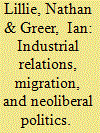

|
|
|
|
|
| Publication |
2007.
|
| Summary/Abstract |
Transnational politics and labor markets are undermining national industrial relations systems in Europe. This article examines the construction industry, where the internationalization of the labor market has gone especially far. To test hypotheses about di ferences between "national systems," the authors examine the United Kingdom, Finland, and Germany, alongside European-level policy making. Regardless of overall national institutional framework, employers seek to avoid industrial relations rules, while unions attempt to relocalize labor relations. Both use shop-floor, national, and European power resources. The authors argue that comparative industrial relations should take seriously the connection between action at the national and transnational levels.
|
|
|
|
|
|
|
|
|
|
|
|
|
|
|
|
| 8 |
ID:
169215


|
|
|
|
|
| Summary/Abstract |
Ronald Dore’s 1979 essay about Japan’s “internationalization” tackled one of the defining themes of Japanese politics, society, and culture over the past decades. In his characteristically witty voice, Dore assessed the myriad ways in which a Japan that was well attuned to global cultures was also capable of reaffirming supposed chasms between Japanese society and the world outside, particularly in political and economic matters. In this article, I place Dore’s compelling essay in the contexts both of his own changing views on Japan over the course of his distinguished and prolific career, as well as in the currents of a Japan that has been transformed dramatically over the past three decades by transnational flows that fall outside the prevailing use of the word kokusaika (internationalization). Dore’s contributions to the field displayed not only his keen engagement with Japanese intellectual and social debates, but also moral judgments regarding the values encoded, reproduced, and sometimes betrayed by institutional environments. By extending the logics of Dore’s work, this article suggests that we might think of internationalization as something not only challenging these environments, but also transformed and embedded within them.
|
|
|
|
|
|
|
|
|
|
|
|
|
|
|
|
| 9 |
ID:
143684


|
|
|
|
|
| Summary/Abstract |
Few factors have a greater impact on the international distribution of power than states’ ability to develop and produce sophisticated weaponry. The Israeli and Swedish cases demonstrate the constraints and opportunities for small states’ defense-industrial bases in a globalizing world. The changing nature of arms production—including mounting weapons costs, globalized supply chains and the rise of multinational defense corporations—forced governments to reevaluate their defense-industrial policies. In each case, governments abandoned the pursuit of defense-industrial self-sufficiency and adopted export-dependent defenseindustrial policies. National strategies differ, however, with Sweden embracing foreign direct investment (FDI) to support incremental innovation and Israel encouraging companies to tap venture capital in pursuit of disruptive innovations. After a decade of sustained growth, the Israeli and Swedish defense-industrial bases today arguably suffer from structural weaknesses rooted in the adaptation policies each state adopted in prior decades and, more particularly, how each encouraged exports and drew on new forms of investment capital.
|
|
|
|
|
|
|
|
|
|
|
|
|
|
|
|
| 10 |
ID:
082616
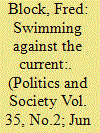

|
|
|
|
|
| Publication |
2008.
|
| Summary/Abstract |
Despite the dominant role of market fundamentalist ideas in U.S. politics over the last thirty years, the Federal government has dramatically expanded its capacity to finance and support efforts of the private sector to commercialize new technologies. But the partisan logic of U.S. politics has worked to make these efforts invisible to mainstream public debate. The consequence is that while this "hidden developmental state" has had a major impact on the structure of the U.S. national innovation system, its ability to be effective in the future is very much in doubt. The article ends by arguing that the importance of these developmental initiatives to the U.S. economy could present a significant opening for new progressive initiatives.
|
|
|
|
|
|
|
|
|
|
|
|
|
|
|
|
| 11 |
ID:
077222
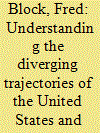

|
|
|
|
|
| Publication |
2007.
|
| Summary/Abstract |
This article proposes a neo-Polanyian theoretical framework for understanding the dynamics within contemporary market societies. It uses this framework to analyze the divergence between the United States and other developed societies that has become more pronounced in the first years of the twenty-first century. The argument emphasizes the shifting political alliances of the business community in the United States and suggests that from 1994 onward, business lost power in the right-wing coalition to its religious Right allies. The growing power of a religious-based social movement is a critical ingredient in the unilateralist turn in the Bush Administration's foreign policy
|
|
|
|
|
|
|
|
|
|
|
|
|
|
|
|
| 12 |
ID:
105894
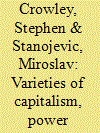

|
|
|
|
|
| Publication |
2011.
|
| Summary/Abstract |
Although Slovenia is a small, relatively new nation-state, it has been justifiably called "neocorporatist" and a "coordinated market economy," making it unique among postcommunist societies, including ten new EU member states. The authors explore how it became so, and in the process shed light on the debate between varieties of capitalism (VoC) and power resources theories about how coordinated or neocorporatist economies emerge. Although several of the elements predicted by the varieties of capitalism perspective were present in Slovenia, others were not. The authors also find that a significant mobilization by organized labor at a crucial point played an essential role, and overall find that power resources theory has greater explanatory power in this case. However, in turning from explaining how the Slovenian model was formed to why it was so unique among postcommunist cases, they find that specific historical legacies were critical, particularly those from the distinct Yugoslav form of communism.
|
|
|
|
|
|
|
|
|
|
|
|
|
|
|
|
| 13 |
ID:
144527


|
|
|
|
|
| Summary/Abstract |
Through an examination of East Asian economies, this paper proposes two new capitalist ideal types: family market economies and state market economies. In contrast to coordinated and liberal market economy types, the new capitalist ideal types proposed here display alternative forms of hierarchical coordination. These ideal types are also genuinely novel models of capitalism because they exhibit distinct and stable institutional structures and comparative advantages.
|
|
|
|
|
|
|
|
|
|
|
|
|
|
|
|
|
|
|
|
|